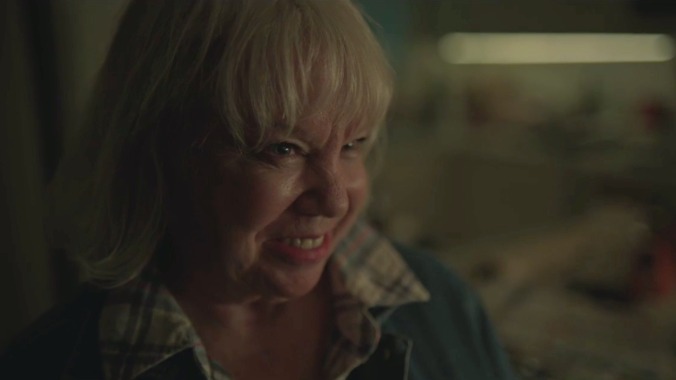There’s the cannibalized child and the trail of tortured innocents that led to him. There’s the rigged explosions of grief, the horror of familial implosion. There’s the rigid criminal justice system, and the cold violence that lives beyond the bars. Bubbling dread, stirred by a skeletal score. And coming into focus? An honest-to-god monster—exactly the thing you convinced yourself didn’t exist. The Outsider’s horrors are grotesque, existential, and mythic. Together, they resonate like the terrors of an Ari Aster or Oz Perkins film: offbeat, unnatural, and slow-burning, a flame inching towards your pinched fingers.
But then last night’s episode gave us three words: “Heya, Jackie-boy!” And suddenly an elderly woman is soaring, Superman-like, across a room and pummeling the absolute dogshit out of a grown man. And suddenly this feels more like It Chapter 2 than the sober and supernaturally cruel crime drama we’ve been watching.
That entity, the one Ralph continues to deem a collective dream, has been an understated presence thus far. Clad in a hoodie, with only the faintest glimpses of a formless face—King calls him the Play-Doh-Faced Man in the novel—the figure occupies an unnerving stillness. When it speaks, it does so in simple, declarative sentences: “Tell him to stop. Or he’ll die. You’ll both die,” it told Jeannie (Mare Winningham) last week. Earlier, Terry’s daughter recalled the hooded thing saying “mean things” to her, though we never heard what they were. We didn’t need to. The drawings of its mangled, liquid face were enough; Holly’s research into the myth of grief-eaters was enough.
So that’s why it was such a shock—and not a good one—when Jack (Marc Menchaca), the boozy, reluctant right-hand of this entity, emerged from the shower to find his dead, grinning mother standing in his living room. “You fucked up, Sonny Jim!” she shouts before administering the aforementioned beatdown. Later, we see his bloodied walls, his scars. He will stop Holly and Ralph, he promises. He won’t fuck up anymore.
From a story perspective, at least, the scene works. It also, if we’re being generous, adds a shade to Jack, as Menchaca’s a good enough actor to capture the subtext: His punishment will resonate that much more if it comes from the woman who abused him as a child. “Why did he have to send you?” he asks, tears in his eyes. Director Karyn Kusama (The Invitation, Destroyer), meanwhile, handles the scene beautifully, pairing the show’s itchy stillness and score with tight, nauseous closeups that build both tension and disorientation. But there remains an innate silliness to the sequence that feels inconsistent for both El Cuco and the show as it’s existed thus far. You could blame the Stephen King book upon which the show is based—it certainly feels like something King may have written, what with his knack for writing mouthy apparitions—but no such scene exists there. That makes it even more odd, and it’s not the only scene from the episode that feels that way.
Holly, for example, has a vision while riding the bus to Georgia, seeing Tracey, the bubble-necked cousin of Heath Hofstadter, in a dream/vision that causes her to scream at the bus driver and nearly cause a crash. And, on two separate occasions, Jack (and Jack alone) sees the words “stop her” written in blood—once on a bathroom wall and once on the backs of his own hands.
None of these moments quite work—not, at least, in the larger framework of the series—but they do represent a turning point that fans of the King’s novel knew was coming. As a novel, The Outsider is excellent, but it’s also as much of a shapeshifter as its villain, evolving from a slice of hard-boiled fiction into a familiar King creature feature in its latter half. Structurally, the introduction of this broader, more overt horror makes sense, what with it emerging as Holly unpacks the supernatural presence haunting the story. But the question is whether the show can gracefully make that transition from a tonal and aesthetic perspective.
The Outsider benefited in the early going from writer Richard Price’s history with crime fiction and police procedurals—an acclaimed novelist and screenwriter, he also helmed 2016’s The Night Of and wrote on The Wire—and its prison-set scenes didn’t need a supernatural presence to be some of the show’s scariest. The supernatural, after all, is near-absent in his previous work. So it says something that this is the first episode to be credited to someone besides Price—Jessie Nickson-Lopez, a Stranger Things and Narcos alum, wrote “The One About The Yiddish Vampire,” and the seams are visible.
In addition to the tonal imbalance, the presence of Jack’s ghostly mother raises more questions: Just how vast are the powers of El Cuco? Are we actually dealing with the bogeyman mythologized in Latinx culture? Holly, operating on a level of intuitiveness that strains credulity, discusses the concept of it issuing a weightless “projection” as it morphs into its next vessel. But the details are confusing: Is it a weightless projection if it can violently assault someone? Also, it can apparently take on other human forms while projecting? How does it know Jack’s mom will terrify him so? Can it read minds and scour memories, too? Is El Cuco just Pennywise? The Outsider’s never felt sloppy until now.
But that isn’t to say it’s lost its way. Narratively, the series is picking up the steam that viewers exhausted by exposition have been craving, and the cast has remained excellent despite these tonal bumps. But things are only going to get weirder from here, and the show’s shape—decidedly Play-Doh-Faced at the moment—will continue to shift, for better or worse.


 Keep scrolling for more great stories.
Keep scrolling for more great stories.